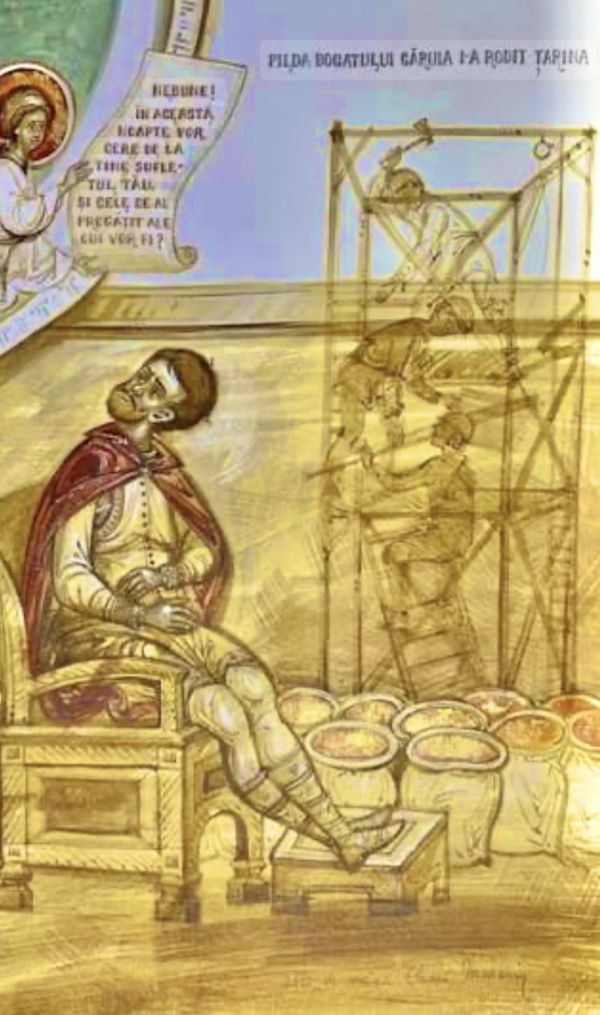Opening armoured gates
(Lk 12:13-21)
«Some parts of our human family, it appears, can be readily sacrificed for the sake of others considered worthy of a carefree existence» [Fratelli Tutti n.18].
Basil the Great commented: «Here we do not condemn those who rob, but those who do not share his».
Senselessness of hoarding.
God’s Gift is complete, but everyone is in need. Why? To accentuate the «fruitful interchange».
And we are experiencing it: only the desire to be ‘born in reciprocity’ can combat the «impoverishment of all» and the same «cultural sclerosis» [cf. FT 133-138].
Each gesture of generosity conceals the blossoming of an innate life-giving energy, which makes the soul and capital flow outside the tight walls and beyond the edges of one’s storage.
A spur that does not make people fall back on convenience. An impulse that will instead shift our imagination towards entirely different horizons, beliefs and desires.
In short, taking communion is a matter of life and death, because rich and poor live or decline together.
Growth is therefore in giving and receiving.
In the unsurpassed Homily 6, the first of the Cappadocian Fathers emphasized that even those who abound in goods are tormented on what to do, asking themselves: «What will I do?».
«He complains like the poor. Are not these the words of who is oppressed by misery? What am I going to do? [...] What will I do? The answer was simple: I will satiate the hungry, open the barns and call all the poor' [...] Do not raise the prices. Do not wait for the famine to open the barns [...] Do not wait for the people to be reduced to hunger to increase your gold, nor the general misery for your enrichment. Do not trade on human misfortunes [...] Do not exacerbate the wounds inflicted by the scourge of adversity. You turn your eyes to your gold and you turn it away from your brother, you recognize every coin and you know how to distinguish the false one from the true one, but you completely ignore the brother who is in need».
The rich man in the parable seems to have no labourers or relatives, no wife, or children and friends: he had them, but in his reality there are - really - only him and possessions.
«Fool!» - God says to him (v.20).
The solution was very simple: opening the gates, so that the piled food could overflow for the needs of the less fortunate - instead of wasting time scrapping and rebuilding warehouses.
Maybe he died of a heart attack, but he was already dead in his soul.
The entrepreneur who scrutinizes the needs of others for profit, immediately perishes inside and outside; he suffers agitation, insomnia, torment, due to the stress of managing those external mirages.
It is these bizarre dreams that take breath away and become endless nightmares, dissipating our best energies.
On the contrary, it is in a climate of coexistence and conviviality of differences that the best stimuli and advice can be found, including for discovering what suits us best.
It would be enough to overcome greed, vanity and the common mindset, to feel better.
By abandoning the spirit of hoarding, we will move away from the obsession with calculation and immediate [fleeting] interests.
In this dynamic, experience opens up to the many faces of reality and people, living by Friendship.
Here, the intensity of our bonds fuels personal motivation, challenges, and the blossoming of love that drives our Vision forward.
Here is the threshold of the new Pearls that vice versa can emerge: to trust in life, in the new roads, in the actions that do not block the development of everyone, nor threaten the sense of Fraternity.
Leaving aside the stockpiling, we can yield to the liberating Exodus.
First step along the Way of our full Happiness: investing the many goods we still have to create Encounter and Relationship.
A matter of life or death (v.20).
[Monday 29th wk. in O.T. October 20, 2025]












